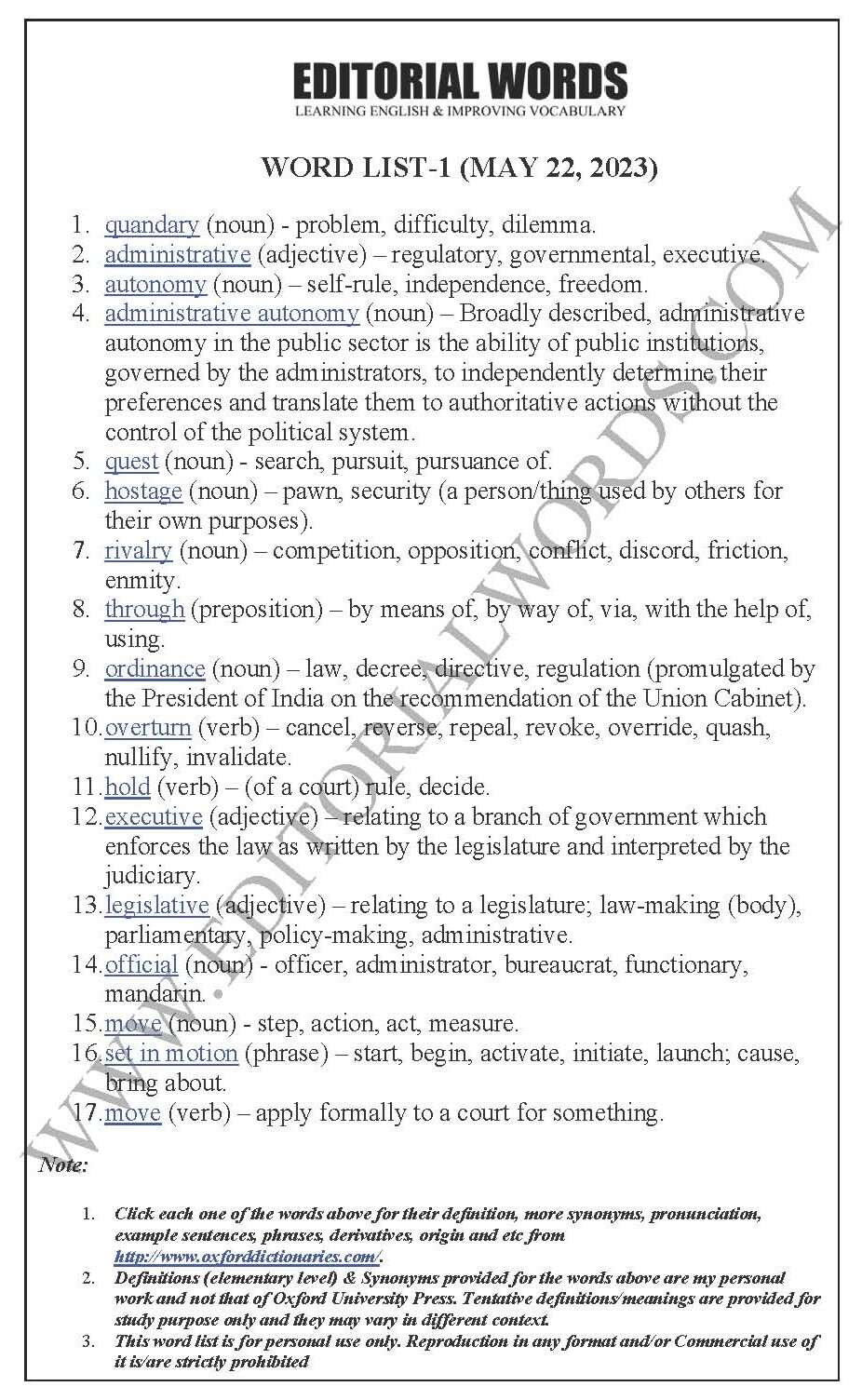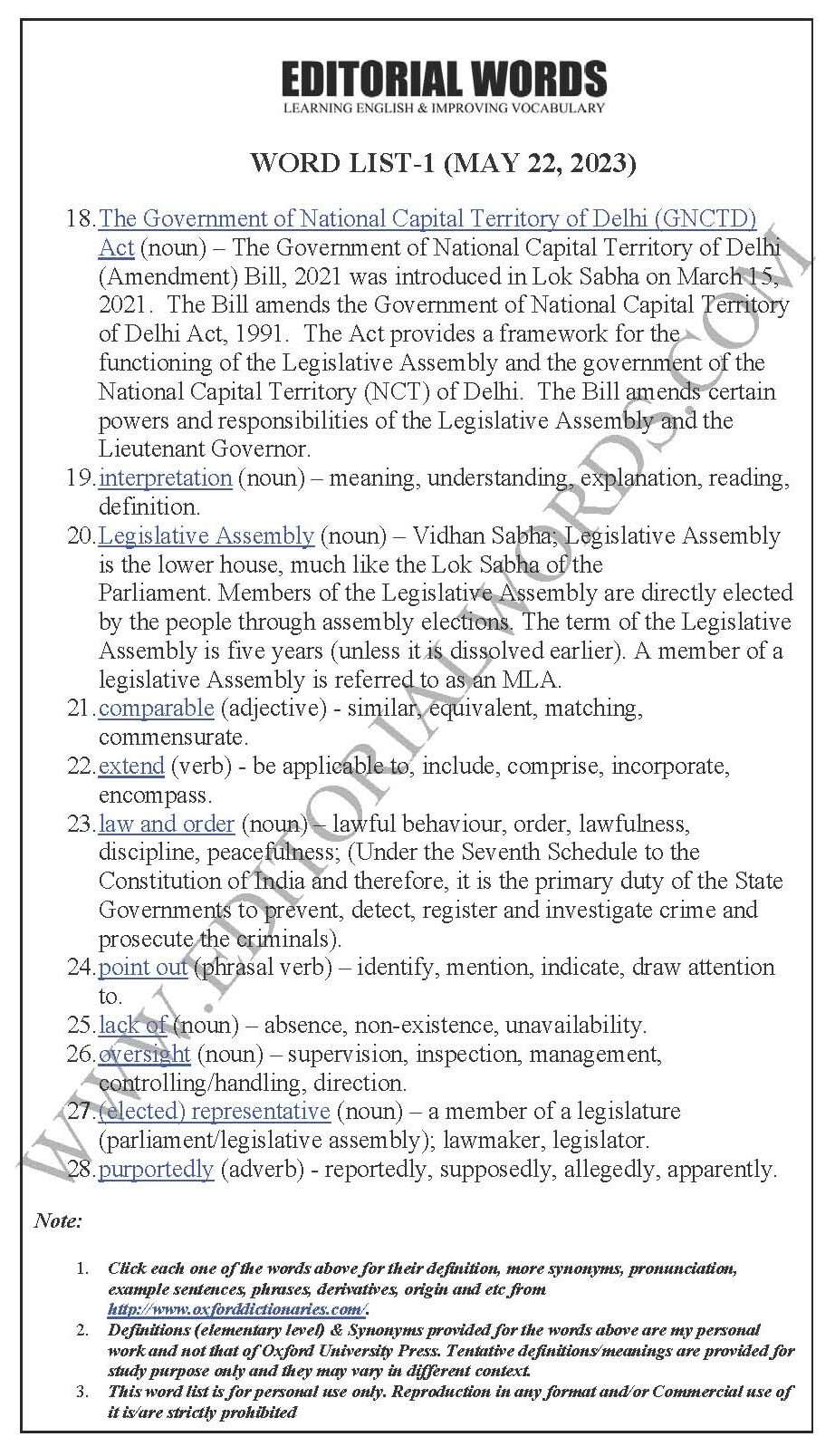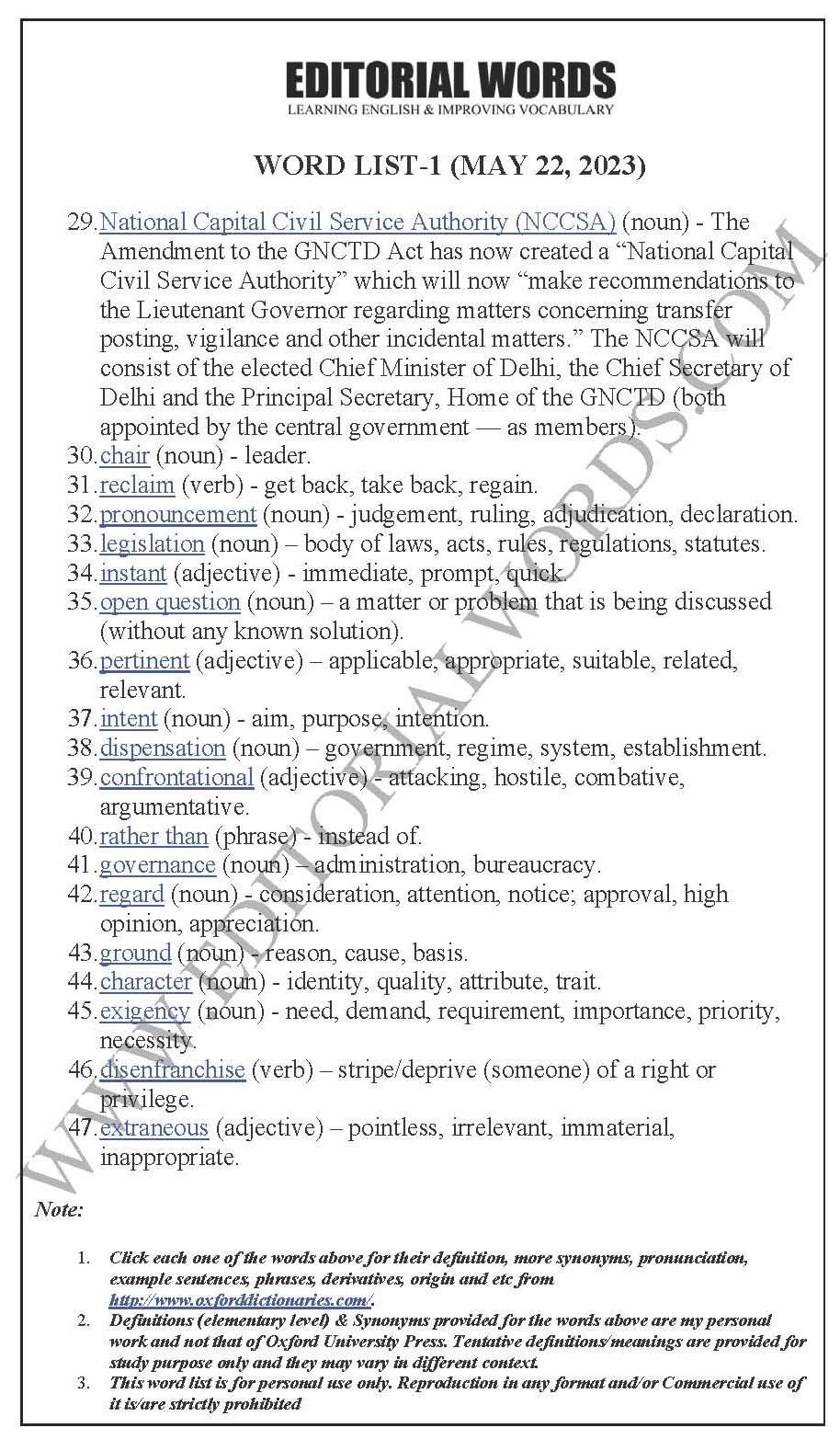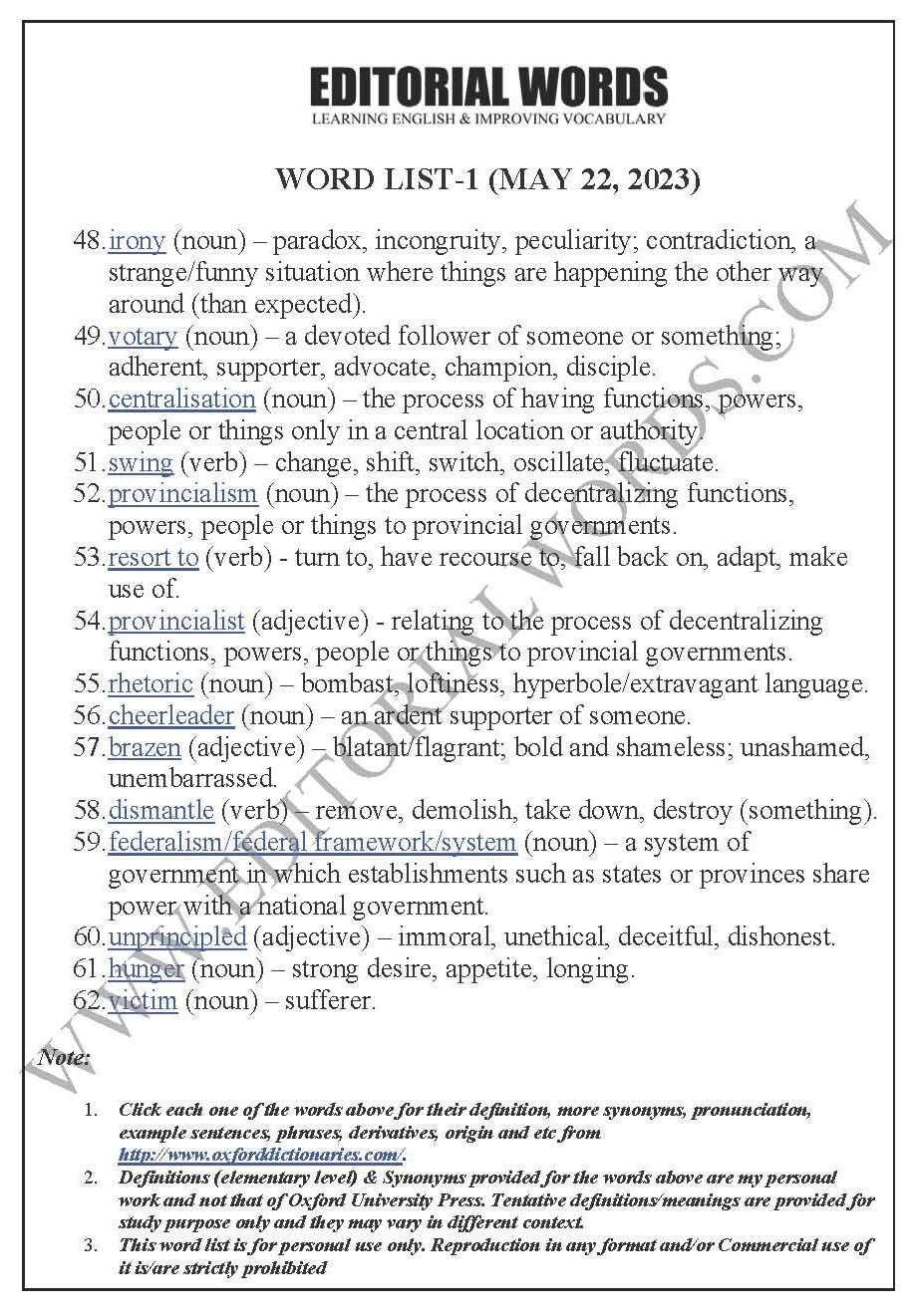The Hindu Editorial (Capital quandary) – May 22, 2023
To read this article, click “The Hindu”.
This preview is provided here with permission.
Courtesy: The Hindu
The Hindu Editorial (Capital quandary) – May 22, 2023:
- quandary (noun) – problem, difficulty, dilemma.
- administrative (adjective) – regulatory, governmental, executive.
- autonomy (noun) – self-rule, independence, freedom.
- administrative autonomy (noun) – Broadly described, administrative autonomy in the public sector is the ability of public institutions, governed by the administrators, to independently determine their preferences and translate them to authoritative actions without the control of the political system.
- quest (noun) – search, pursuit, pursuance of.
- hostage (noun) – pawn, security (a person/thing used by others for their own purposes).
- rivalry (noun) – competition, opposition, conflict, discord, friction, enmity.
- through (preposition) – by means of, by way of, via, with the help of, using.
- ordinance (noun) – law, decree, directive, regulation (promulgated by the President of India on the recommendation of the Union Cabinet).
- overturn (verb) – cancel, reverse, repeal, revoke, override, quash, nullify, invalidate.
- hold (verb) – (of a court) – rule, decide.
- executive (adjective) – relating to a branch of government which enforces the law as written by the legislature and interpreted by the judiciary.
- legislative (adjective) – relating to a legislature; law-making (body), parliamentary, policy-making, administrative.
- official (noun) – officer, administrator, bureaucrat, functionary, mandarin.
- move (noun) – step, action, act, measure.
- set in motion (phrase) – start, begin, activate, initiate, launch; cause, bring about.
- move (verb) – apply formally to a court for something.
- The Government of National Capital Territory of Delhi (GNCTD) Act (noun) – The Government of National Capital Territory of Delhi (Amendment) Bill, 2021 was introduced in Lok Sabha on March 15, 2021. The Bill amends the Government of National Capital Territory of Delhi Act, 1991. The Act provides a framework for the functioning of the Legislative Assembly and the government of the National Capital Territory (NCT) of Delhi. The Bill amends certain powers and responsibilities of the Legislative Assembly and the Lieutenant Governor.
- interpretation (noun) – meaning, understanding, explanation, reading, definition.
- Legislative Assembly (noun) – Vidhan Sabha; Legislative Assembly is the lower house, much like the Lok Sabha of the Parliament. Members of the Legislative Assembly are directly elected by the people through assembly elections. The term of the Legislative Assembly is five years (unless it is dissolved earlier). A member of a legislative Assembly is referred to as an MLA.
- comparable (adjective) – similar, equivalent, matching, commensurate.
- extend (verb) – be applicable to, include, comprise, incorporate, encompass.
- law and order (noun) – lawful behaviour, order, lawfulness, discipline, peacefulness; (Under the Seventh Schedule to the Constitution of India and therefore, it is the primary duty of the State Governments to prevent, detect, register and investigate crime and prosecute the criminals).
- point out (phrasal verb) – identify, mention, indicate, draw attention to.
- lack of (noun) – absence, non-existence, unavailability.
- oversight (noun) – supervision, inspection, management, controlling/handling, direction.
- (elected) representative (noun) – a member of a legislature (parliament/legislative assembly); lawmaker, legislator.
- purportedly (adverb) – reportedly, supposedly, allegedly, apparently.
- National Capital Civil Service Authority (NCCSA) (noun) – The Amendment to the GNCTD Act has now created a “National Capital Civil Service Authority” which will now “make recommendations to the Lieutenant Governor regarding matters concerning transfer posting, vigilance and other incidental matters.” The NCCSA will consist of the elected Chief Minister of Delhi, the Chief Secretary of Delhi and the Principal Secretary, Home of the GNCTD (both appointed by the central government — as members).
- chair (noun) – leader.
- reclaim (verb) – get back, take back, regain.
- pronouncement (noun) – judgement, ruling, adjudication, declaration.
- legislation (noun) – body of laws, acts, rules, regulations, statutes.
- instant (adjective) – immediate, prompt, quick.
- open question (noun) – a matter or problem that is being discussed (without any known solution).
- pertinent (adjective) – applicable, appropriate, suitable, related, relevant.
- intent (noun) – aim, purpose, intention.
- dispensation (noun) – government, regime, system, establishment.
- confrontational (adjective) – attacking, hostile, combative, argumentative.
- rather than (phrase) – instead of.
- governance (noun) – administration, bureaucracy.
- regard (noun) – consideration, attention, notice; approval, high opinion, appreciation.
- ground (noun) – reason, cause, basis.
- character (noun) – identity, quality, attribute, trait.
- exigency (noun) – need, demand, requirement, importance, priority, necessity.
- disenfranchise (verb) – stripe/deprive (someone) of a right or privilege.
- extraneous (adjective) – pointless, irrelevant, immaterial, inappropriate.
- irony (noun) – paradox, incongruity, peculiarity; contradiction, a strange/funny situation where things are happening the other way around (than expected).
- votary (noun) – a devoted follower of someone or something; adherent, supporter, advocate, champion, disciple.
- centralisation (noun) – the process of having functions, powers, people or things only in a central location or authority.
- swing (verb) – change, shift, switch, oscillate, fluctuate.
- provincialism (noun) – the process of decentralizing functions, powers, people or things to provincial governments.
- resort to (verb) – turn to, have recourse to, fall back on, adapt, make use of.
- provincialist (adjective) – relating to the process of decentralizing functions, powers, people or things to provincial governments.
- rhetoric (noun) – bombast, loftiness, hyperbole/extravagant language.
- cheerleader (noun) – an ardent supporter of someone.
- brazen (adjective) – blatant/flagrant; bold and shameless; unashamed, unembarrassed.
- dismantle (verb) – remove, demolish, take down, destroy (something).
- federalism/federal framework/system (noun) – a system of government in which establishments such as states or provinces share power with a national government.
- unprincipled (adjective) – immoral, unethical, deceitful, dishonest.
- hunger (noun) – strong desire, appetite, longing.
- victim (noun) – sufferer.
Note:
1. Click each one of the words above for their definition, more synonyms, pronunciation, example sentences, phrases, derivatives, origin and etc from http://www.oxforddictionaries.com/.
2. Definitions (elementary level) & Synonyms provided for the words above are my personal work and not that of Oxford University Press. Tentative definitions/meanings are provided for study purpose only and they may vary in a different context.
3. This word list is for personal use only. Reproduction in any format and/or Commercial use of it is/are strictly prohibited.
The Hindu Editorial (Capital quandary) – May 22, 2023:




“Phrasal Verbs” We Learnt Last Week
“Idioms & Phrases” We Learnt Last Week
“Important Definitions” We Learnt Last Week
Recent Word Lists For The Hindu Editorial Articles

The Centre has through an ordinance overturned a Supreme Court judgment of May 11 that held that the elected government of the National Capital Territory of Delhi had executive and legislative powers over its officials. For further reading, visit “The Hindu”. Below is today’s word list-1 for The Hindu Editorial (Capital quandary) – May 22, 2023.